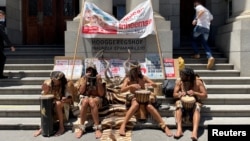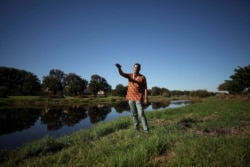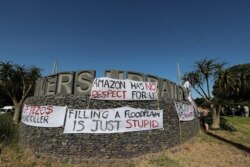South Africa's Indigenous Khoi and San people are in court to block construction of the planned African headquarters for online retail giant Amazon. Opponents say the project will ruin a historically significant riverside site in Cape Town and harm the environment.
Closing arguments are being heard Friday.
The site is slated to be developed into a 70,000-square-meter complex that will house Amazon, along with other businesses. City authorities approved construction of the nine-story complex last year.
But some Indigenous Khoi San leaders and community groups are trying to reverse the decision, saying it undermines the city's own heritage and environmental standards.
"We're in a situation where a terrain that is so sacred to the people of our country is not just under threat, but being damaged and destroyed as we speak," said Tauriq Jenkins, high commissioner of the Goringhaicona Khoi Khoin Indigenous Traditional Council, which is among the groups fighting the project.
Construction has already begun at the site, which is currently occupied by a restaurant and golf course.
Property owners Liesbeek Leisure Properties Trust, or LLPT, said it did consult Indigenous groups while planning the site's redevelopment.
In a statement, company spokesperson James Tannenberger said the opposing community group and Indigenous council led by Jenkins "have been driving a misinformation campaign …after their concerns were validly dismissed by the competent authorities during the comprehensive three-year development approval process."
Other Indigenous leaders have given their approval to the project, Tannenberger added.
He said the new site will also pay tribute to their history by including a museum and memorial site, along with creating low-income housing and jobs.
The current divide within the Indigenous community is complex.
The Khoi Khoi and San were some of the country's first inhabitants and their presence in the southern tip of Africa dates back thousands of years.
Their lands were lost to colonial settlements in the 1600s.
"They're enslaved, they're oppressed, they're exploited," said June Bam-Hutchison, a researcher with the Center for African Studies at the University of Cape Town. "Their language was also taken away, their culture was taken away, their knowledge systems that sort of helped us in so many ways to build a more peaceful and healthier society, that has also taken away."
She said their unique cultural identity was only acknowledged by South Africa in more recent decades.
"Today, they are now being recognized. That took some time. The land question remains very much unresolved, highly disputed," she added.
The riverside development is contentious because of the site's history.
The Khoi San say it lies on a battlefield where they defended their territory from Portuguese colonizers in 1510.
Jenkins said losing the case would set a dangerous precedent for giving up historic sites to corporate interests.
Amazon, which does not own the site but will be leasing the space once constructed,declined to comment.










